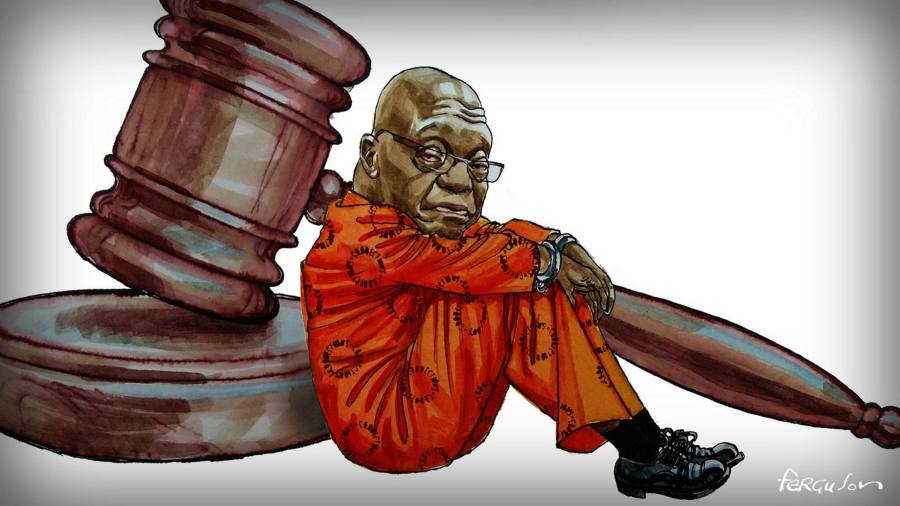The imprisonment last week of Jacob Zuma, the former president of South Africa, underlined a fundamental truth. The survival of democracy depends on an independent judiciary.
International politics is currently disfigured by a plague of leaders who want to govern unconstrained by the law. These would-be strongmen are not confined to autocracies such as China. They have also emerged in countries that hold free elections, such as India, Turkey, Brazil, Israel and even the US, self-styled “leader of the free world”.
The difference between successful strongmen and those whose ambitions are thwarted is, more often than not, the strength of the judicial system. If a ruler can eliminate the independence of the courts, the door is open to the destruction of democracy, untrammelled corruption and the suppression of freedom of speech. But if the courts can hold the line, political freedom has a chance.
Jacob Zuma was, in many ways, a classic strongman leader: charismatic, corrupt and contemptuous of institutions. As president, he cultivated a close relationship with Russia’s Vladimir Putin. Zuma also used Trumpian rhetoric, encouraging race-based conspiracy theories and denouncing judges.
Populist leaders often dismiss inconvenient facts as “fake news”. But in the courts, truth and accountability still matter. The words of Sisi Khampepe, the acting chief justice who sentenced Zuma, carried real weight: “No person enjoys exclusion or exemption from the sovereignty of the laws of the republic. And Mr Zuma is no exception.”
The significance of independent courts is underlined by the contrasting fortunes of Donald Trump and Putin. Trump’s efforts to subvert US democracy were thwarted by court after court. Even Supreme Court judges that Trump appointed in the hope that they would favour him chose to follow the law.
By contrast, when Alexei Navalny flew back into Russia to challenge Putin, he was immediately arrested, put on trial and imprisoned. When the Kremlin requires it, the Russian courts are willing to deliver absurd verdicts, such as convicting Navalny of violating his parole, when he was in hospital fighting for his life after being poisoned.
Strongman leaders and would-be autocrats understand the danger of independent courts. Before Xi Jinping took power in 2012, many Chinese liberals hoped the country’s legal system could gain some independence from the Communist party. Under Xi those hopes have been crushed. Zhou Qiang, China’s chief justice, gave a speech in 2017 in which he denounced “judicial independence” as “an erroneous western notion” that “threatens the leadership of the Communist party”. China’s campaign to crush dissent in Hong Kong has swiftly begun to threaten the independence of Hong Kong’s courts.
The destruction of judicial independence is a crucial step in the construction of an autocracy — which is why the EU is so concerned about legal “reforms” in Poland and Hungary. The political future of countries such as Turkey, India, Brazil and Israel may also hinge on whether the courts are strong enough to rein in the autocratic tendencies of their leaders. All four are democracies that have elected strongman figures who display disdain for democratic checks and balances.
In Israel, the court system held firm and corruption proceedings against Benjamin Netanyahu went ahead, even when, as prime minister, he denounced the judiciary. He has now lost office, after an election.
In Brazil, the courts are likely to play a crucial role next year if, as seems likely, President Jair Bolsonaro loses his bid for re-election and then claims, Trump-style, that the election was fraudulent. Fortunately, the Brazilian judicial system is robust and politically independent. In recent years, former president Luiz Inácio Lula da Silva was first imprisoned for corruption, and then freed after a court ruling. Both judgments were controversial but they were made without political pressure.
Turkey, by contrast, has seen an assault on its judicial system in recent years. Following a failed coup in 2016, thousands of judges and prosecutors were sacked or jailed. Free elections still take place but successful opposition politicians can end up in prison or on trial.
The Indian courts, meanwhile, have failed to check the authoritarian instincts of the Modi government. The death last week of Father Stan Swamy, an 88-year-old human rights activist who was repeatedly denied bail after being implausibly accused of terrorism, has highlighted the system’s failings. Some senior judges stand accused of getting too close to the ruling party.
Losing an independent judiciary makes it impossible to hold leaders to account for corruption or abuse of power. Zuma’s nine years in office saw a rapid growth in corruption and “state capture” by powerful interests. South Africa’s economy, infrastructure and reputation paid a heavy price. With Zuma’s imprisonment, the rebuilding can begin in earnest.
Because South Africa is a young democracy — with deep social and economic divisions — there was no guarantee the judiciary would survive the assault from Zuma and his allies. That the former president is in prison is a tribute to the robustness of the country’s legal system. It should also serve as an inspiration for other troubled democracies.
By: GIDEON RACHMAN
Source: FT



